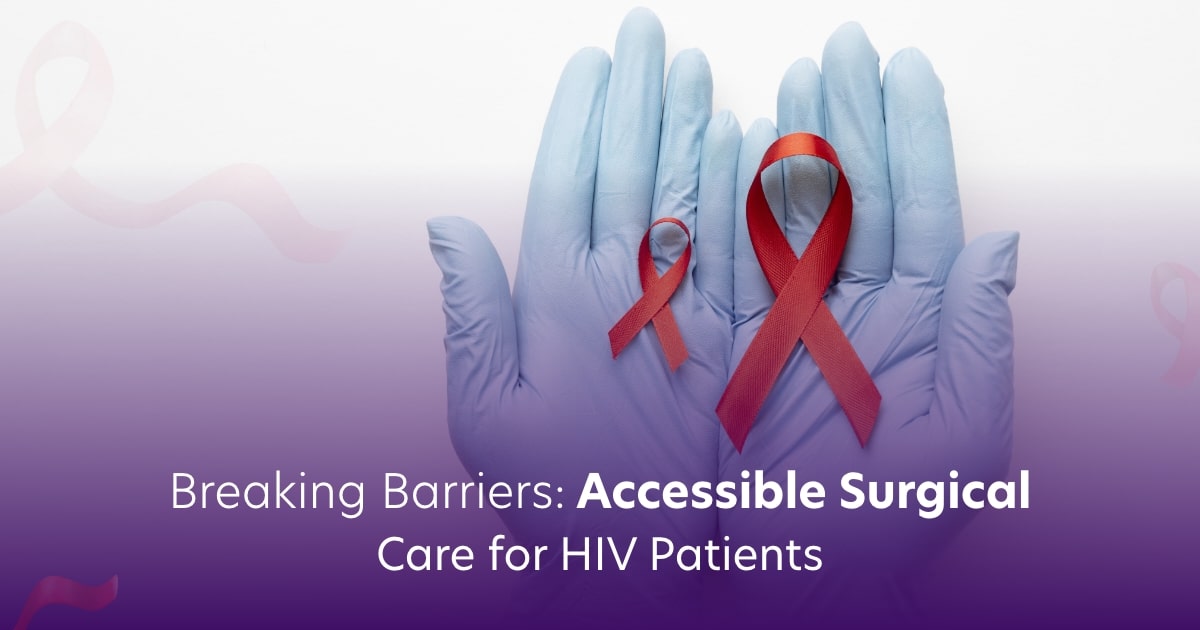
Breaking Barriers: Accessible Surgical Care for HIV Patients
In the world of healthcare, access to quality medical services is a right that should be available to all individuals, including those dealing with HIV (Human Immunodeficiency Virus).
This article highlights the importance of providing accessible care to HIV patients undergoing elective surgeries. By addressing the unique challenges and implementing strategies to overcome them, we can ensure HIV positive patients receive the necessary treatment and care they deserve.
Understanding HIV and Surgical Considerations
HIV, or Human Immunodeficiency Virus, is a medical condition that affects the immune system, making individuals more prone to infections and other illnesses.Regarding elective surgeries, HIV patients require specialized attention due to weakened immune systems.The patient's level of viral infection, CD4 cell count, and overall health are crucial in determining the surgical approach and post-operative HIV patient care.
Barriers to Accessible Care for HIV Positive Patients
Unfortunately, numerous factors prevent accessible care for HIV patients undergoing various surgeries.In most cases, healthcare providers may have limited knowledge and confusion about HIV, resulting in insufficient care.
As a result, financial limitations and insurance coverage issues further increase the difficulties faced by HIV positive patients who have to go through elective surgery. Additionally, the limited availability of specialized healthcare facilities adds to the challenges.
Strategies for Accessible Care for HIV Positive Patients
To achieve accessible care for HIV positive patients, it is imperative to implement various strategies.Creating a supportive and non-discriminatory healthcare environment is crucial to ensure that every patient feels comfortable and respected throughout their medical journey.
Education and training programs for healthcare providers can help improve their understanding of HIV, debunk misconceptions, and promote compassionate care. Advocacy for policy changes and enhanced insurance coverage is essential to guarantee equal access to surgical treatments.Collaboration between HIV specialists and surgical teams fosters an integrated approach to care, ensuring the best patient outcomes.
Ensuring Safe and Successful Elective Surgeries for HIV Patients
HIV patients need comprehensive evaluations before elective surgery. Close checkup by surgical teams allows for tailored care plans and proper treatment. Appropriate management during the surgery is crucial to minimize the risk of complications. To facilitate a smooth recovery, post-operative care and monitoring should consider HIV-specific considerations.
Future Directions and Recommendations
Continued research and advancements in HIV care and surgery are necessary to improve outcomes and enhance accessibility. Integrating HIV care into surgical practice can help bridge the gap and ensure that HIV positive patients receive complete care throughout their surgical journey.
Following standard protocols are essential like the Universal HIV safety kit.It contains disposable hood caps, face masks with triple layers, surgical gowns that are water resistant, disposable gloves, non-woven shoe covers, safety goggles, and disposable waste bags that provide all the necessary safety for the treating team to be able to carry out the procedures while managing risks.
Final Words
Accessible care for HIV patients undergoing elective surgeries is a matter of utmost importance.By breaking barriers, we can ensure that HIV positive patients, regardless of their HIV status, receive equitable and high-quality healthcare. Our collective responsibility is to fight for change, implement strategies, and foster a healthcare environment that can make surgical care for HIV patients easily possible. We can create a future where accessible care for HIV is the norm, leaving no one behind.
With FirstCure, you don't have to worry about elective surgeries if you are an HIV positive patient. We provide better treatments for all of your issues and elective surgeries to the greatest extent possible! Call us at 953 8180 300 and book your appointment with us!
Why talk to Us?
We at FirstCure have top doctors equipped with most advanced procedures at guranteed lowest cost. We will assist you at every step from booking consultations, second opinions, arranging diagnostic tests, insurance approvals and related paperwork, admission to discharge and post surgery follow up consultation.